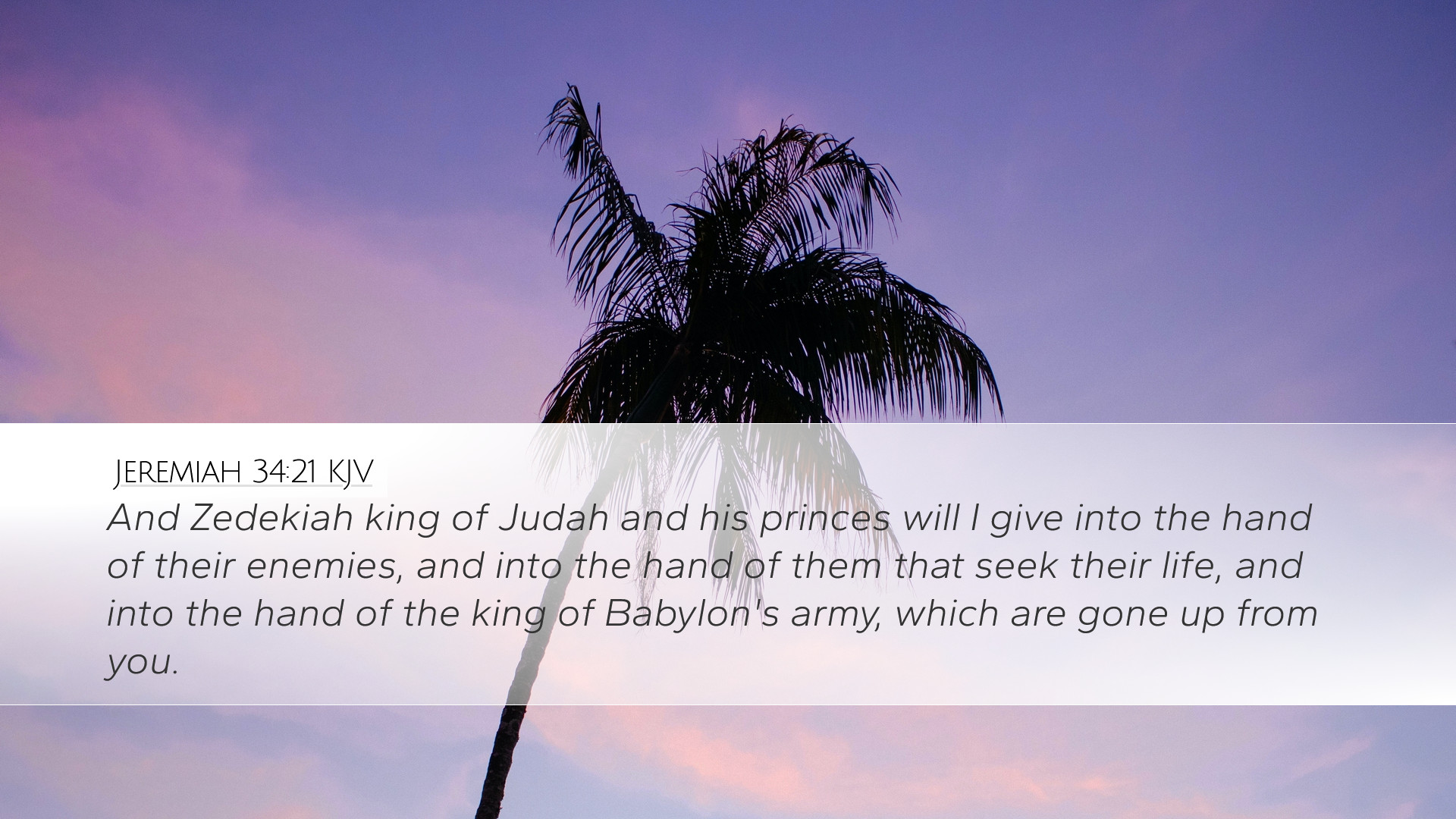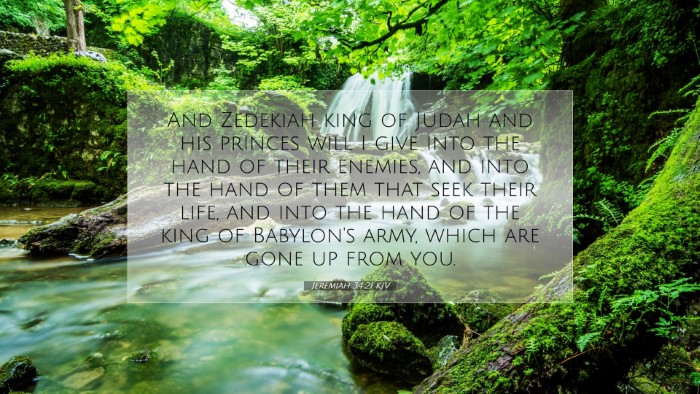Commentary on Jeremiah 34:21
Verse: "And Zedekiah king of Judah and his princes will I give into the hand of their enemies, and into the hand of those that seek their life, and into the hand of the king of Babylon’s army, which are gone up from you."
Introduction
This verse falls within a significant moment in the Book of Jeremiah, where the impending doom of Jerusalem and its king is portrayed. Jeremiah, as a prophet, articulates the consequences of disobedience and the sovereign judgment of God. Through the lens of various public domain commentaries, we explore the depth of this message.
Historical Context
The context of Jeremiah 34:21 is rooted in the final days of the kingdom of Judah. The ruling king Zedekiah had rebelled against Babylon and sought to ally with various factions, which ultimately led to his downfall. Understanding the background of Zedekiah’s rule helps us grasp the weight of the prophecy Jeremiah relayed.
Matthew Henry's Perspective
Matthew Henry emphasizes the sovereign hand of God in the affairs of nations. He notes that God's decision to deliver Zedekiah and his princes into the hands of their enemies is a clear manifestation of divine judgment. The reference to “the king of Babylon’s army” signifies the fulfillment of God's word as declared through Jeremiah. Henry notes:
“God's judgments are often executed by the very instruments that men would think could not be applied to them.”
This reflects the unimaginable consequences of their rebellion against God. Henry further discusses the implications of disobedience and the importance of heeding divine warnings.
Albert Barnes' Commentary
Albert Barnes provides insight into the implications of this verse. He underscores the fate of Zedekiah, who despite receiving ample warnings, chose the path of alignment with those who were doomed to destruction. Barnes explains that:
“Zedekiah is a figure of the finality of rebellion against God. His story serves as a cautionary tale for future generations about the consequences of turning away from divine mandates.”
Barnes elaborates on the nature of Zedekiah's kingship. Stripped of God’s favor, he could not withstand the Babylonian siege. The inevitability of God’s justice stands central to his interpretation.
Adam Clarke's Exegesis
Adam Clarke takes a theological approach, pointing out the broader spiritual implications inherent in the captivity of Zedekiah. He notes:
“This passage encapsulates the tragic irony of human autonomy. In attempting to assert control through alliances and defiance, Zedekiah only hastened his downfall.”
Clarke highlights the theological principle that God's judgments, while appearing harsh, are ultimately founded in justice and mercy. They offer a path to repentance even in dire circumstances. He encourages readers to ponder the nature of God as both just and merciful, especially in a litigious age where divine retribution seemed distant.
Theological Implications
The collective commentary from Matthew Henry, Albert Barnes, and Adam Clarke yields profound theological insights. Within Jeremiah 34:21, several themes emerge that resonate deeply with pastors, students, theologians, and scholars.
- Divine Sovereignty: Central to the understanding of this verse is the affirmation of God's sovereignty over nations and hierarchies. The text reinforces the belief that God orchestrates history to fulfill His divine purposes.
- Judgment and Mercy: The narrative demonstrates how judgment operates, revealing both the consequences of sin and the possibilities for redemption. This theme is significant for preaching as it frames the dual nature of God's interaction with humanity.
- Human Responsibility: Zedekiah’s choices reflect a broader principle of human responsibility. The commentary emphasizes the active role individuals play in either aligning with or straying from God's will.
- Prophetic Voice: The importance of heeding prophetic warnings remains relevant today. The experiences of Zedekiah serve as a reminder of the necessity for congregations to respect and understand the prophetic messages delivered through God's chosen vessels.
Conclusion
Jeremiah 34:21 is not merely a historical account; it is a profound declaration of God’s sovereignty, judgment, and the call to repentance. The insights gleaned from Matthew Henry, Albert Barnes, and Adam Clarke collectively enhance our understanding of this text. As we reflect on Zedekiah's fate, we are compelled to consider how we respond to God’s voice today—in our churches, communities, and personal lives.


